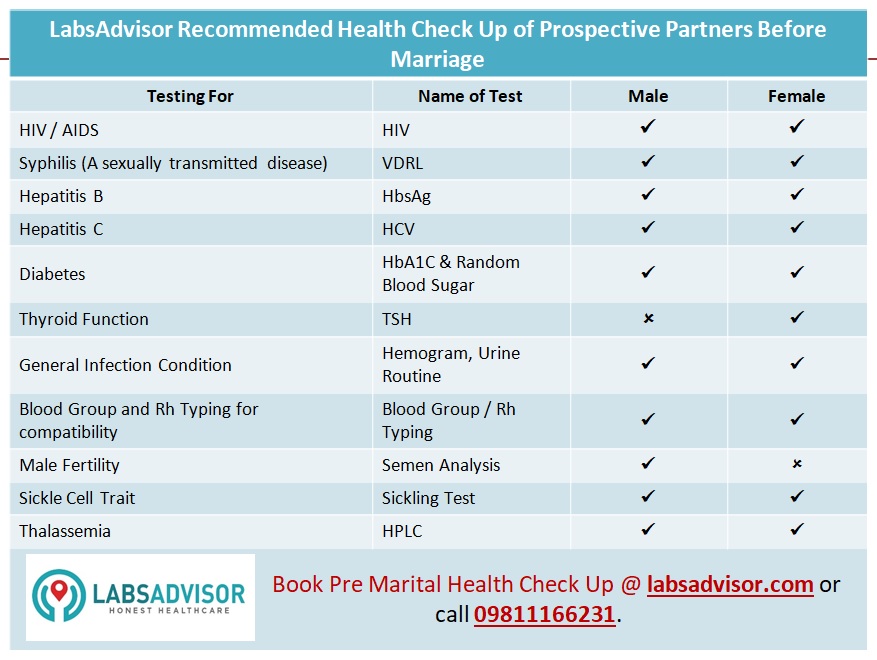Find Pre Marriage / Pre Marital Checkup Cost in all the labs, compare prices and book appointment online with up to 60% discount at over 250+ labs in 30+ cities exclusively through LabsAdvisor – “India’s Largest Online Medical Test Platform.” Served more than 10 lakh happy customers across the country.
Pre-Marital Checkup Cost
View all the labs for the pre-marriage health checkup and updated prices by clicking on the links as it may vary.
| Find Labs, Cost & Book Appointment | Test Price Starting From |
| Pre-Marital Checkup Price – Male | ₹ 2,500 |
| Pre-Marital Checkup Price – Female | ₹ 2,500 |
Currently, we are unable to offer Pre Martial checkup. Apologies!
To get a call back from our customer care team, click on the button below.

Frequently Asked Questions About Pre Marital Checkup
What are the parameters covered?
Parameters covered in the Female Pre-marital Checkup
- Complete Hemogram
- Blood Group & Rh Typing
- RBS (Random Blood Sugar)
- HbA1C (for type I and type II diabetes)
- HPLC (for thalassemia)
- VDRL (for Syphilis)
- HIV
- HbsAg (for Hepatitis B)
- HCV (for Hepatitis C)
- Sickling Test (to check if a carrier of a sickle-cell trait)
- TSH (for thyroid hormone)
- Urine Routine
Parameters covered in the Male Pre-Marital Checkup
- Complete Hemogram
- Blood Group & Rh Typing
- RBS (Random Blood Sugar)
- HbA1C (for type I and type II diabetes)
- HPLC (for thalassemia)
- VDRL (for Syphilis)
- HIV
- HbsAg (for Hepatitis B)
- HCV (for Hepatitis C)
- Sickling test (to check if a carrier of sickle cell trait)
- Urine routine
- Semen Analysis (for fertility)
Why is the test before marriage done?
After one and a half years of marriage, Sangeeta is so excited about her pregnancy. She goes for a pre-maternal test. The test results leave her devastated. She is tested HIV positive. Knowing her lifestyle, she is sure about having contracted the infection from her husband. Her baby also runs a high risk of getting HIV infected. Three lives are now in danger. Her distraught parents now repent not urging for pre-marital health checkup of the groom as suggested by their family doctor.
88% of marriages in India are arranged. Marriages are expected to last forever. Kundli of prospective bride and groom are matched to ensure the compatibility issues. Parents evaluate every little aspect that can affect their son’s or daughter’s married life. They spend a lot of time and money to find a perfect match for their progeny. But they tend to overlook or are unaware of the health aspect of the marriage. A comprehensive medical check-up for the prospective spouse is as important as matching kundlis. These tests not only include sexually transmitted diseases, but also illnesses like diabetes, thalassemia, and thyroid dysfunction.

Pre-marital testing is a set of comprehensive medical tests that can ensure better medical compatibility between partners. For couples considering marriage, pre-marital screening helps identify their own as well as each other’s potential health problems and risks for their future offspring. It is vital for couples to be screened to help them understand their medical status and help them take the necessary precautions or treatments.
Dr. I. S. Gilada, President of AIDS Society of India emphasizes, “Even if a partner tests positive for HIV, he/she can be rejected only as ‘medically unfit’ and won’t have to carry the stigma of an HIV/AIDS patient. Vice-verse, if they decide to go ahead with the marriage, it is with fullest knowledge and understanding, so they can’t blame anyone”.
Nowadays, where people are so conscious about health and fitness, it becomes logical enough for both the partners to be ascertained before entering a relationship. LabsAdvisor.com has devised a premarital package consisting of all the tests that rule out the factors, deficiencies or diseases that may interfere with a happy married life. It also aids them to understand their genetics and help them take the necessary precautions or treatments.
What are the benefits of Pre-marriage test?
- Assess the positive health status of prospective bride and groom – Complete Blood Count (CBC), Complete Urine Analysis and Peripheral Blood Smears are done to check for normal and abnormal cells.
- Detect the presence of any infectious diseases – Hepatitis B infection, HIV or Hepatitis C.
- Identify if your partner-to-be is a carrier of genetic disorders which in turn helps in assessing the risk of having children with a severe form of the disease. The couple can then choose whether to have an affected child. e.g. Thalassemia or Sickle Cell Disease.
- To help them be better prepared when they plan to start a family by knowing the thyroid level and blood group. Also, be aware of the fertility index of your partner.
Tests that a couple must get done before getting married
Genotype
This test will reveal if you are a carrier of a sickle-cell gene. Sickle cell anemia is a hereditary disease caused by inheritance of the sickle-cell gene. For a baby to be born with sickle cell anemia, both parents must carry a sickle cell gene. So, this test is a very important test as if you and your partner both carry the sickle cell gene, you run a high risk of having a baby born with a serious disease.
HIV and Other Sexually Transmitted Disease
Sexually transmitted diseases like HIV, Hepatitis B, Hepatitis C, and Syphilis are chronic and serious conditions that may put a strain to a marriage. Many countries have laws that require you to tell your partner about your HIV status before vowing in.
The knowledge of the status of your partner-to-be helps you protect yourself or seek adequate medical care if he/she turns out to be positive. It also gives you an option to make an informed decision to go ahead with the marriage. This will reduce the risk of infertility and miscarriages during a marriage.
Blood Group Testing
ABO-RH testing is important to screen out the RH-factor incompatibility and counsel women about the risks involved in the pregnancy. If a woman who is RH Negative and a man who is RH Positive conceive a baby, there is the risk for a baby to have health problems. The baby growing inside the mother with RH-Negative blood may have RH-Positive blood, inherited from the father. This RH-factor incompatibility may cause the intermingling of mother and baby’s blood resulting in the production of antibodies. These antibodies may destroy the red blood cells of the baby.
If known in advance the doctor can give anti-Rh immune-globulin shots during her first pregnancy. The Rh immune-globulin shots work like a vaccine, which prevents the mother’s body from producing any dangerous Rh antibodies that can cause serious complications in the new-born or complicate any future pregnancies.
Fertility Test
This is a test done to ascertain the fertility of a couple. More often, a couple is unaware that they have fertility problems until about 2 or more years of marriage and after unsuccessful trials at conceiving. The test is really important as fertility issues can be concluded earlier without going through any social or emotional trauma related to barrenness.
The fertility test typically includes a semen analysis for the man to assess for male fertility and test for ovulation for the woman.
Screening for Chronic Diseases
Chronic diseases like diabetes and thyroid function problems must be screened for. This is because they have a negative effect on the outcome of a pregnancy. Any couple intending to marry must know their thyroid and diabetic status because of the association of these conditions with infertility and high-risk pregnancies.
Thalassemia Test
This is a test done to detect the thalassemia gene in a couple. Thalassemia is an inherited blood disorder characterized by the production of big, abnormal hemoglobin. Because they are not normal, red blood cells that carry this hemoglobin are constantly destroyed, leading to anemia. A thalassemia major patient may need a regular blood transfusion.
If both parents carry the thalassemia gene, their child may have completely normal blood, or it may be a carrier or may have a severe thalassemia disease.
In each pregnancy, there is a 25% chance that their child will have normal blood, a 50% chance that the child will be a thalassemia carrier and a 25% chance that the child will have thalassemia major disease. With a test called thalassemia profile (HPLC), a couple can know whether they carry the trait and if they do, they can implore assisted reproductive technology to prevent their babies from inheriting the disease.
Also, carrying a thalassemia trait is not a disease nor an illness. A thalassemia trait is passed down from parents to children. Being a trait carrier is not contagious.
Interesting topics you may look for by LabsAdvisor
- Hair Fall Package
- Overweight Health Checkup
- Underweight Health Checkup
- Smoker’s Health Check
- STD Testing
- Lifeless Skin Health Checkup






